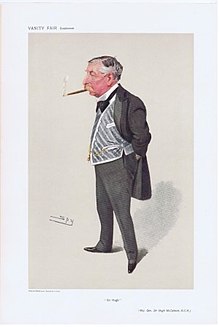Hugh McCalmont
Sir Hugh McCalmont | |
|---|---|
 Sir Hugh McCalmont | |
| Born | 9 February 1845 Dublin, Ireland |
| Died | 2 May 1924 (aged 79) London, England |
| Allegiance | |
| Service | |
| Rank | Major-General |
| Commands | 8th Division |
| Battles / wars | Red River Rebellion Third Anglo-Ashanti War Russo-Turkish War South African War Second Anglo-Afghan War Anglo-Egyptian War Nile Expedition |
| Awards | Knight Commander of the Order of the Bath Commander of the Royal Victorian Order |
Major-General Sir Hugh McCalmont KCB CVO (9 February 1845 – 2 May 1924) was an Anglo-Irish soldier, politician, and horseman. He was elected as an Irish Unionist Member of Parliament for North Antrim in 1895, resigning in 1899 by becoming Steward of the Manor of Northstead.
Early life and education
Hugh McCalmont was born in Dublin, the eldest son of James McCalmont (of Abbeylands, Belfast) and Emily Anne Martin.[1] He was educated at Eton and Christ Church, Oxford.[2]
He was the half-nephew of author Violet Florence Martin and the composer Robert "Ballyhooly" Martin, who composed the Killaloe March,[2] both younger than him, being children of his maternal grandfather's second marriage.
Career
McCalmont was commissioned into the 6th Dragoon Guards in 1865.[3] He saw service in the Red River Rebellion in 1870, the Third Anglo-Ashanti War in 1873 and the Russo-Turkish War in 1877.[4] McCalmont also took part in the South African War in 1879, the Second Anglo-Afghan War in 1879 and the Anglo-Egyptian War in 1882 as well as the Nile Expedition in 1884.[4]
In 1884 he became aide-de-camp to General Wolseley.[5] He was elected as an Ulster Unionist Member of Parliament for North Antrim in 1895 but resigned in 1899 by becoming Steward of the Manor of Northstead.[6]
He was commanding the troops in the Cork district, when on 1 April 1902 he became General Officer Commanding 8th Division within Third Army Corps in Ireland.[7][8] He served temporarily as commander of the Third Army Corps from December 1902 to March 1903, during the absence for a royal tour of India of the Commander, the Duke of Connaught and Strathearn.[9]
In 1907 he was given the colonelcy of the 7th Queen's Own Hussars, a position he held until his death in 1924.
McCalmont lived at Abbeylands, a two-storey Victorian house in Whiteabbey, near Belfast, until it was set on fire by Suffragettes in 1914[10] causing £20,000 of damage.[11][12] Unionist leader, Edward Carson, had declared against votes for women, meanwhile his Ulster Volunteer Force (UVF) had been drilling troops at Abbeylands House. In protest the Suffragettes burnt the building to the ground on 27 March 1914, complaining that they were being imprisoned while the UVF were gun running and preparing for civil war.[13][14][15]
Personal life
In 1885, he married the Hon. Rose Elizabeth Bingham, daughter of John Charles Robert Bingham, 4th Baron Clanmorris of Newbrook.[1] His son, Dermot McCalmont (1887–1968), inherited a fortune from his second cousin, Harry McCalmont, and was the owner of race horse The Tetrarch.[16]
References
- ^ a b Burke, Sir Bernard, ed. (1914). Burke's Peerage, Baronetage & Knighthood (76th ed.). Burke's Peerage & Gentry. p. 2404.
- ^ a b "Obituary: Sir Hugh McCalmont – Soldier and Horseman". The Times. 3 May 1924. p. 14.
- ^ "No. 22983". The London Gazette. 23 June 1865. p. 3152.
- ^ a b "The families of French of Belturbet and Nixon of Fermanagh, and their descendants by Henry Biddall Swanzy, p.15". Archived from the original on 20 May 2015. Retrieved 16 October 2011.
- ^ C.E. Callwell (ed.), The Memoirs of Major-General Sir Hugh McCalmont (Hutchinson, London, 1924), pp. 47–48.
- ^ "New Ulster Biography". Archived from the original on 9 October 2011. Retrieved 26 February 2011.
- ^ "No. 27434". The London Gazette. 16 May 1902. p. 3254.
- ^ Army Commands Archived 5 July 2015 at the Wayback Machine
- ^ "Naval & Military intelligence". The Times. No. 36939. London. 1 December 1902. p. 10.
- ^ Bence-Jones, Mark (1988). A Guide to Irish County Houses. London: Constable. p. 1. ISBN 0-09-469990-9.
- ^ "The Women's Suffrage Movement" (PDF). NI Assembly Education. Archived (PDF) from the original on 4 March 2016. Retrieved 16 April 2015.
- ^ Burning Outrage in Ireland Archived 18 December 2021 at the Wayback Machine The Mercury, 30 March 1914
- ^ "The suffragette struggle in Ulster". Belfast News Letter. Archived from the original on 16 April 2015. Retrieved 16 April 2015.
- ^ "Prison, Protests and Hunger Strikes". Belfast Media Group. Archived from the original on 16 April 2015. Retrieved 16 April 2015.
- ^ "A role in Home Rule". Irish Times. Archived from the original on 13 November 2014. Retrieved 16 April 2015.
- ^ "McCalmont, Dermot Hugh Bingham (Major) (1887–1968)". www.horseracinghistory.co.uk. Archived from the original on 14 August 2020. Retrieved 18 December 2021.
